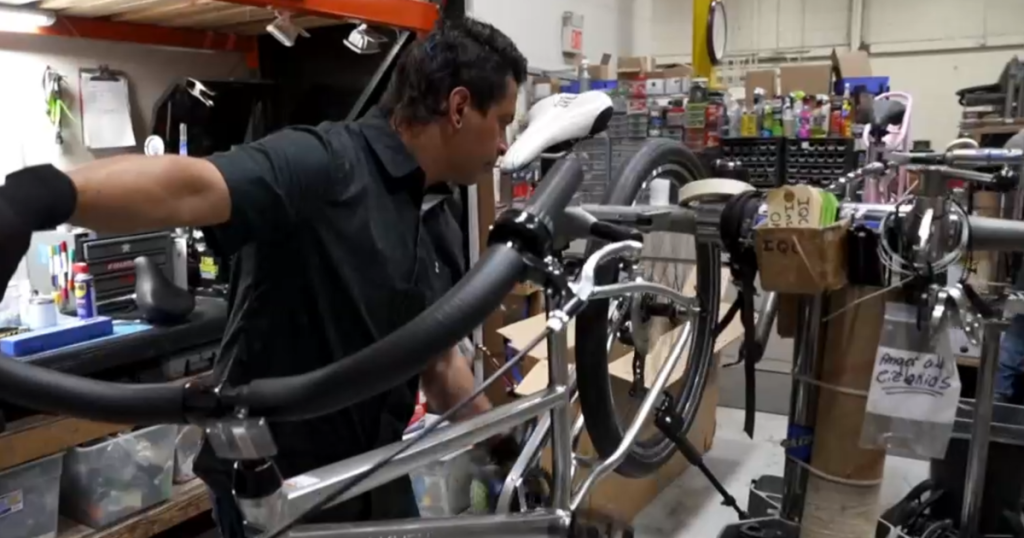The Kamler family, owners of Kent International based in Fairfield, New Jersey, have been heavily impacted by recent tariffs imposed on imported bicycles and parts. Founded over four generations ago, Kent International has grown significantly since its inception but now faces serious challenges due to a trade environment that makes it increasingly difficult to operate competitively. The new tariffs, totaling over 180%, have forced the company to halt orders from China, jeopardizing its supply chain and pricing strategy.
| Article Subheadings |
|---|
| 1) Overview of Kent International’s Operations |
| 2) Tariff Impact on Pricing Structure |
| 3) Shift Away from Chinese Suppliers |
| 4) Financial Challenges of Local Manufacturing |
| 5) Future Prospects and Strategies |
Overview of Kent International’s Operations
Kent International has a rich legacy in the bicycle industry, owned by the Kamler family for generations. The business began with just six employees when Arnold Kamler joined in 1972, including his parents. Currently, the company has expanded to employ over 200 people and is recognized as one of Walmart’s major suppliers, selling around two million bicycles annually in the U.S. Despite its substantial growth, the company now finds itself navigating a challenging political and economic landscape due to recent tariff implementations by the U.S. government.
Tariff Impact on Pricing Structure
The latest wave of tariffs has drastically altered Kent International’s financial outlook. Approximately 90% of its bicycles are imported from China. The company’s expenditures have surged due to a newly imposed tariff rate that has reached up to an astonishing 181.47% for certain shipments. Although Arnold Kamler previously mentioned paying a 25% tariff on bikes and parts, the switch in tariffs has added another layer of financial strain. During a month-long period from March to April, the company incurred $3.1 million in tariffs alone. This substantial financial burden affects not only the company but also its pricing strategy, potentially leading to higher retail prices for consumers.
Shift Away from Chinese Suppliers
In response to these challenges, Kent International has decided to cancel new orders from China. With plans to refrain from placing additional orders in May, the company finds itself in a precarious situation with its supply chain. Arnold Kamler conveyed his frustration about the inability to pivot quickly to alternative suppliers, adding that attempts to redistribute business to countries not currently facing tariffs have been largely unsuccessful. Despite employing strategies to limit reliance on China, the company still faces significant financial pressures.
Financial Challenges of Local Manufacturing
While some businesses may consider shifting manufacturing back to the United States to avoid tariffs, for Kent International, such a move is financially unfathomable. Arnold Kamler articulated the difficulties by recounting his experiences with domestic suppliers. One anecdote involved a quote for handlebars, which had previously been manufactured for a nominal cost; a new supplier’s quote was over eight times that amount. The barriers to local manufacturing not only apply to components but extend to the final assembly of bicycles, resulting in the potential for a $1,000 retail price on a bike that would typically sell for $100. The cost differential makes it difficult for the company to compete in a global market.
Future Prospects and Strategies
Looking ahead, the Kamler family is weighing their options in light of these tariff challenges. Arnold’s sentiment is framed by a palpable sense of unfairness, especially since they had already begun to diversify their supply chain before the tariffs were implemented. The company is keen on finding feasible strategies that may allow them to mitigate the financial burden without compromising on quality. Although the potential for new orders from countries not currently facing tariffs exists, the unpredictability of the market remains a major concern. Kent International must adapt its strategies promptly or risk facing further decline in its operational capabilities.
| No. | Key Points |
|---|---|
| 1 | Kent International is facing a significant financial burden due to tariffs imposed by the U.S. government. |
| 2 | The company has a legacy of over four generations in the bicycle industry. |
| 3 | Approximately 90% of the company’s bicycles are imported from China. |
| 4 | Kent International incurred $3.1 million in tariffs during a one-month period. |
| 5 | The company is exploring alternatives to Chinese suppliers but is struggling to find viable options. |
Summary
Kent International’s predicament underscores the broader implications of current trade policies as experienced by American businesses. The substantial tariffs imposed on imported bicycles and parts force the company to reevaluate its sourcing strategies, all while grappling with increased production costs and market pressures. As the Kamler family seeks to navigate these challenges, their story reflects the uncertainties faced by many in the U.S. manufacturing and retail sectors.
Frequently Asked Questions
Question: What are the primary issues facing Kent International due to tariffs?
Kent International faces significant financial pressures from tariffs over 180% on bicycle imports, compelling them to reevaluate their supply chain and pricing strategies.
Question: How much has Kent International spent on tariffs recently?
The company incurred $3.1 million in tariffs during a one-month period from March 20 to April 20, highlighting the financial strain tariffs have introduced to their operations.
Question: Is Kent International considering local manufacturing?
While local manufacturing could avoid tariffs, the costs are prohibitive, making it financially unviable for Kent International to produce bicycles domestically compared to overseas manufacturing.


